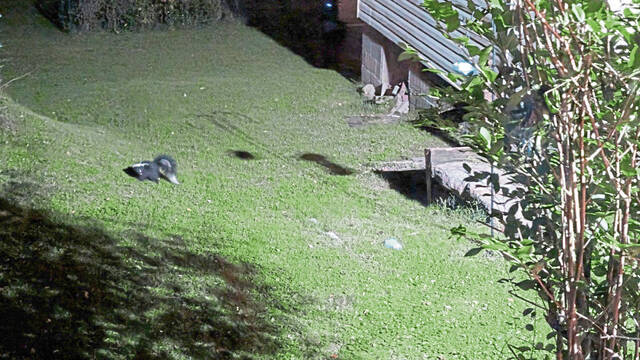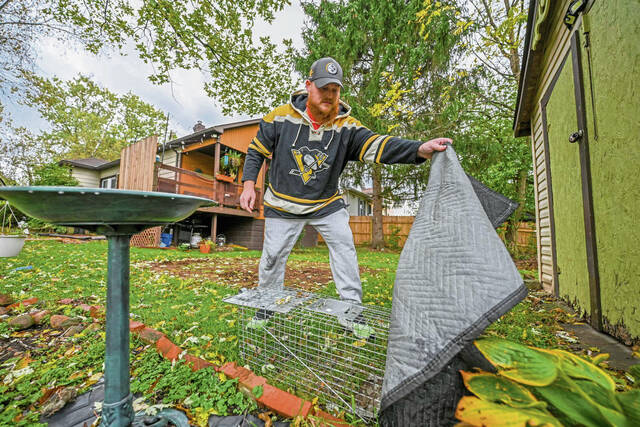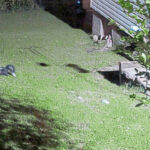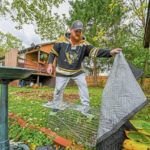Jeff Pennington moved to Harrison in April and started seeing skunks almost immediately.
In the roughly half-year of living in the Campton section of the township, his dog has been sprayed by skunks twice. While Pennington has lived in rural areas before, he said he was surprised by the number of skunks he sees while living in Harrison.
“Almost every night, between midnight and 5 a.m., you get woken up by the smell of them spraying,” he said.
He has tried to trap the critters but has been unsuccessful. He recently posted his situation on Facebook and found other neighbors are dealing with the same issue.
“I’ve never had engagement like that on a Facebook post,” he said. “It sounds like a lot of this neighborhood is seeing it.
“And if they’re not seeing it, they’re smelling it.”
Pennington tried a few options to deter the animals, which include putting down cayenne pepper and orange peels over areas in his yard.
Another resident who only identified herself as Megan said her family’s dogs also have fallen victim to the skunks.
She sees multiple skunks walking together up and down neighborhood streets almost night, she said. The situation causes she and her neighbors to be cautious when leaving for working during early morning hours. The smell of skunk, she said, is part of daily life in the neighborhood.
Pennington said his attempts to contact officials to remedy the issue haven’t gone anywhere. Harrison officials redirected him to the county and the Game Commission. He said the Game Commission told him to hire a professional to remove the skunk, but that’s not feasible because of costs and the number of skunks he and his neighbors have seen in the area.
“When it’s one skunk, that’s a perfectly understandable thing, but we’ve seen so many,” he said.
He hopes officials can hire an outside party to get rid of the skunks or explore any other avenues possible.
“I’d like to see them trapped and get rid of them in any form or fashion,” Pennington said.
Harrison Manager Amy Rockwell said the township has not received many calls regarding skunks. She said the Game Commission is responsible for managing certain aspects of wildlife, which includes skunk infestations.
“They can provide guidance on proper trapping techniques and the regulations for handling nuisance wildlife,” Rockwell said.
She encouraged residents to reach out to the Game Commission before taking any action. A Game Commission spokesman didn’t respond to requests for comment for this article.
Pete Eisert of Pete’s Wildlife Control Services in York recommends people dealing with skunks call a licensed nuisance animal control operator to handle the situation. Often, that includes trapping the animal.
But the best thing people can do to eliminate skunks and other rodents is to prevent them from coming onto their property in the first place, he said.
The biggest offenders, Eisert said, include people feeding feral cats at nighttime and leaving dishes of food on their back porch. Instead, people should feed animals during the daytime and remove food dishes when done.
“Because of that strong fish odor, it’s going to attract skunks and other wildlife,” he said.
Open garbage containers, bird feeders and compost piles also can attract wildlife.
“A lot of the things that attract skunks attract everything else as well,” he said.
Once trapped and removed, it’s important for homeowners to then exclude wildlife, Eisert said. That can be done by installing mesh fencing under a deck, for example, or removing clutter in yards. People should block off any openings under porches, sheds or decks where skunks might seek shelter.
Placing a grub treatment in yards could be efficient, but Eisert noted that technique isn’t a 100% way to prevent skunks from clawing up a yard. Skunks eat more than just grubs — they also eat earthworms and slugs, he said.
Rockwell also recommended people install motion-activated lights: Because skunks are nocturnal, bright lights can deter them from entering someone’s property.
“Skunks are most active in the spring and summer, which aligns with their mating and birthing seasons,” Rockwell said. “Increased activity in the fall is typically due to young skunks becoming independent and preparing for winter.”
Animals can experience irritation if sprayed, Eisert said. He recommended a recipe of hydrogen peroxide, baking soda and liquid dish detergent to remove the skunk’s foul-smelling oil from a person or their pet.
Pennington said he has used a similar recipe to remove the smell from his pet.
Skunks are considered a “rabies vector species,” which means they can pose a threat to people if touched, Eisert said. While skunks can carry rabies, it is not transmitted through spray but rather through saliva or by the bite of an infected skunk, according to the National Capital Poison Center.
Skunk spray is best classified as an “irritant,” according to the poison center. People exposed to skunk spray can experience short-term stinging, burning, redness and tearing in their eyes, according to the poison center. While rare, the odor has the potential to worsen asthma symptoms.
If a dog or pet is sprayed in their eyes or mouth, symptoms include drooling, vomiting, red or swollen eyes, sneezing and temporary blindness, the poison center said.











